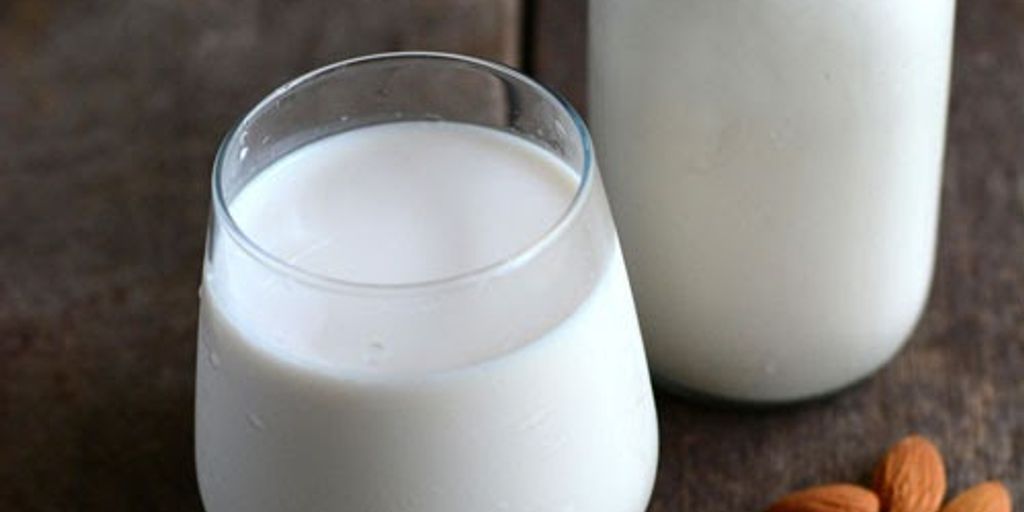With the increasing popularity of almond milk as a dairy alternative, many dog owners wonder if it’s safe to share this plant-based beverage with their canine companions. While almond milk may offer some benefits, it’s essential to understand its potential risks and how to introduce it safely to your dog’s diet.
Key Takeaways
- Almond milk is a plant-based beverage made from almonds and water, often fortified with vitamins and minerals.
- Some dog owners consider almond milk for their pets due to lactose intolerance, health trends, and curiosity.
- While almond milk is generally safe for dogs in small amounts, it can pose risks such as gastrointestinal issues and the presence of harmful additives like xylitol.
- Always check the ingredient list for harmful additives and introduce almond milk gradually while monitoring for any adverse reactions.
- There are healthier alternatives to almond milk for dogs, including other plant-based milks and dog-safe dairy products.
What is Almond Milk?
Almond milk is a popular plant-based milk substitute made from almonds. It’s a great option for those who are lactose intolerant or following a vegan diet. But what exactly is almond milk, and how is it made? Let’s dive in!
How is Almond Milk Made?
The process of making almond milk starts with soaking almonds in water. Once the almonds are soaked, they are blended with fresh water until smooth. The mixture is then strained to remove the solids, leaving behind a creamy liquid. This liquid is what we know as almond milk. It’s important to note that the actual almond content in some commercial almond milks can be quite low, so always check the label if you’re looking for a product with a higher almond content.
Nutritional Content of Almond Milk
Almond milk is low in calories and contains no cholesterol or saturated fat. Here’s a quick look at the nutritional content of a typical serving of almond milk:
| Nutrient | Amount per Serving |
|---|---|
| Calories | 30-50 |
| Protein | 1g |
| Fat | 2.5g |
| Carbohydrates | 1-2g |
| Calcium | 20-45% of RDI |
Common Uses of Almond Milk
Almond milk is incredibly versatile and can be used in a variety of ways:
- In Coffee and Tea: A popular dairy-free alternative to regular milk.
- In Smoothies: Adds a creamy texture without the dairy.
- In Baking: Can be used as a substitute for cow’s milk in most recipes.
- As a Drink: Enjoy it straight from the glass, often flavored with vanilla or chocolate.
Almond milk is a versatile and nutritious option for those looking to avoid dairy. However, it’s essential to choose a product that meets your nutritional needs and preferences.
Why Some Dog Owners Consider Almond Milk
Many dog owners are always on the lookout for new and healthy treats for their furry friends. Almond milk has become a popular choice for several reasons.
Lactose Intolerance in Dogs
Just like some people, many dogs don’t digest dairy products very well. This is where almond milk comes in as a potential alternative. Lactose intolerance in dogs can lead to upset stomachs, diarrhea, and other digestive issues. Almond milk, being lactose-free, seems like a good option for those pups who can’t handle regular milk.
Health Trends Among Pet Owners
With the rise in awareness about plant-based diets and healthier lifestyles, pet owners are also looking to extend these benefits to their pets. Almond milk is often seen as a healthier, plant-based alternative to cow’s milk. This trend is part of a broader movement where pet owners are more conscious about what they feed their dogs, aiming for more natural and less processed options.
Curiosity and Treats
Sometimes, it’s just about curiosity. Pet owners might wonder if their dogs would enjoy almond milk as a special treat. After all, dogs are part of the family, and sharing a bit of what we enjoy can be a way to bond. However, it’s important to remember that not all human foods are safe for dogs, so always proceed with caution.
While almond milk can be a tempting treat for your dog, it’s crucial to ensure it’s given in moderation and without harmful additives.
Is Almond Milk Safe for Dogs?
Potential Benefits of Almond Milk for Dogs
Almond milk can be a safe treat for dogs when given in moderation. It’s a lactose-free alternative, which is great for dogs that are lactose intolerant. Additionally, almond milk contains vitamin E, which can be beneficial for your dog’s skin and coat.
Risks and Concerns
While almond milk is generally safe, there are some risks to consider. It’s high in calories, so overfeeding can lead to weight gain. Also, some almond milk brands contain additives like xylitol, which is extremely toxic to dogs. Always check the ingredients before offering almond milk to your pet.
Veterinary Opinions
Most veterinarians agree that almond milk is not necessary for a dog’s diet but can be given as an occasional treat. They emphasize the importance of a balanced diet for overall well-being and caution against overfeeding any treats, including almond milk.
Always consult your vet before introducing new foods to your dog’s diet, especially if they have existing health conditions.
Remember: Dogs benefit from a balanced diet that includes raw vegetables, fruits, and meats for improved health, digestion, and disease prevention.
Ingredients to Watch Out For

When it comes to almond milk for dogs, there are a few ingredients that you should be cautious about. Some additives can be harmful to your furry friend, so it’s essential to read the ingredient list carefully before offering almond milk to your dog.
How to Introduce Almond Milk to Your Dog

Introducing almond milk to your dog can be a fun and rewarding experience, but it’s important to do it right. Moderation is key when it comes to giving your dog almond milk. Too much can lead to gastrointestinal issues like diarrhea or vomiting. Here’s how you can safely introduce almond milk to your furry friend.
Signs Your Dog Might Be Allergic or Intolerant
Gastrointestinal Symptoms
If your dog is allergic or intolerant to almond milk, you might notice some gastrointestinal symptoms. These can include vomiting, diarrhea, and an upset stomach. Keep an eye out for any changes in your dog’s bathroom habits after they consume almond milk. If you see any of these symptoms, it might be a sign that almond milk isn’t agreeing with them.
Skin Reactions
Another sign of an allergy or intolerance is skin reactions. Your dog might start scratching more than usual or develop red, irritated patches on their skin. Sometimes, these reactions can be severe and lead to hair loss or sores. If you notice your dog scratching excessively or if their skin looks irritated, it’s a good idea to stop giving them almond milk and consult your vet.
Behavioral Changes
Behavioral changes can also indicate an allergy or intolerance. If your dog seems lethargic, unusually irritable, or just not themselves, it could be a reaction to almond milk. Pay attention to any sudden changes in your dog’s behavior after introducing almond milk into their diet. If they seem off, it might be best to discontinue the almond milk and see if their behavior improves.
Healthy Alternatives to Almond Milk
If you’re looking for other options besides almond milk for your dog, there are plenty of healthy alternatives to consider. Here are a few that might work well for your furry friend:
Other Plant-Based Milks
Plant-based milks like coconut, soy, hemp, and oat milk can be good options. These milks are generally lower in fat and sugar, which reduces the risk of weight gain and diabetes. However, they are also lower in calcium and protein compared to regular milk. Always check the ingredient list to ensure there are no harmful additives.
Dog-Safe Dairy Products
If your dog isn’t lactose intolerant, you might consider dog-safe dairy products like plain yogurt or goat’s milk. These can be mixed with dry dog food to enhance the taste and nutritional value. Just make sure to avoid any products with added sugars or artificial sweeteners.
Homemade Dog Treats
Making homemade dog treats can be a fun and healthy way to give your dog a special snack. You can use ingredients like fruits, vegetables, and even some grains to create tasty and nutritious treats. This way, you have full control over what goes into your dog’s diet.
Remember, any new food should be introduced gradually to monitor for any adverse reactions. Always consult your vet before making significant changes to your dog’s diet.
Recipes Featuring Almond Milk for Dogs

Frozen Almond Milk Treats
If your dog loves cold treats, these frozen almond milk goodies are perfect! Simply mix almond milk with a bit of peanut butter and pour the mixture into ice cube trays. Freeze them for a few hours, and voila! Your dog will have a refreshing snack that’s both tasty and hydrating.
Almond Milk Dog Biscuits
For a crunchy treat, try making almond milk dog biscuits. Combine almond milk, whole wheat flour, and a bit of honey. Roll out the dough, cut it into fun shapes, and bake at 350°F for about 20 minutes. These biscuits are sure to have your dog coming back for more!
Almond Milk Smoothies
Smoothies aren’t just for humans! Blend almond milk with some dog-safe fruits like bananas and blueberries. You can even add a spoonful of plain yogurt for extra creaminess. This smoothie makes a great breakfast treat or a cool-down snack on a hot day.
Pro Tip: Always use unsweetened almond milk and avoid any additives that could be harmful to your dog.
Frequently Asked Questions About Dogs and Almond Milk
Can Puppies Have Almond Milk?
Puppies have sensitive stomachs and developing digestive systems, so it’s best to avoid giving them almond milk. Stick to puppy-specific formulas and consult your vet before introducing any new foods.
How Often Can Dogs Drink Almond Milk?
Plain, unsweetened almond milk can be given as an occasional treat, but it shouldn’t be a regular part of your dog’s diet. It’s high in calories and can cause an upset tummy if given too often. Remember, treats should only make up about 10% of your dog’s daily caloric intake.
What to Do If Your Dog Drinks Too Much Almond Milk
If your dog accidentally consumes a large amount of almond milk, monitor them for any signs of discomfort or gastrointestinal issues. Common symptoms include diarrhea, vomiting, and lethargy. If you notice any of these, contact your vet immediately.
Always consult your vet before introducing new foods to your dog’s diet, especially if they have a history of dietary sensitivities or allergies.
Conclusion
So, can dogs have almond milk? The short answer is yes, but with some caveats. While plain, unsweetened almond milk can be a safe occasional treat for your furry friend, it’s important to remember that moderation is key. Always check the ingredients to ensure there’s no xylitol, which is toxic to dogs. And keep an eye on your pup for any signs of digestive upset. At the end of the day, there are plenty of other healthier treats out there that might be better suited for your dog’s diet. So, if you do decide to share your almond milk, do it sparingly and with caution. Your pup will thank you!
Frequently Asked Questions
Can puppies have almond milk?
Puppies have sensitive stomachs and developing digestive systems, so it’s generally best to avoid giving them almond milk. Consult your veterinarian before introducing any new food or drink to your puppy’s diet.
How often can dogs drink almond milk?
Dogs can have almond milk occasionally as a treat, but it should not be a regular part of their diet. Almond milk is high in calories and can cause digestive issues if consumed in large quantities.
What should I do if my dog drinks too much almond milk?
If your dog drinks too much almond milk, monitor them for any signs of gastrointestinal distress such as vomiting or diarrhea. If symptoms persist or worsen, contact your veterinarian for advice.
Is almond milk safe for dogs with lactose intolerance?
Yes, almond milk is a lactose-free alternative that can be given to dogs with lactose intolerance. However, it should be given in moderation and without any harmful additives like xylitol.
Can almond milk cause allergies in dogs?
Yes, some dogs may be allergic to almonds or other ingredients in almond milk. Signs of an allergic reaction can include itching, swelling, or gastrointestinal issues. If you notice any of these symptoms, discontinue use and consult your veterinarian.
Are there any harmful ingredients in almond milk I should avoid?
Yes, some almond milk products contain harmful ingredients like xylitol, artificial sweeteners, and certain preservatives. Always check the label and opt for plain, unsweetened almond milk without any additives.
Can almond milk be used in homemade dog treats?
Yes, almond milk can be used in homemade dog treat recipes. Just make sure it is plain and unsweetened. Monitor your dog for any adverse reactions when introducing new ingredients.
What are some alternatives to almond milk for dogs?
Alternatives to almond milk for dogs include other plant-based milks like coconut milk (in moderation) and dog-safe dairy products like plain yogurt. Always consult your veterinarian before introducing new foods to your dog’s diet.



